October 2024
Are You Suffering From Ingrown Toenails?
Recognizing Foot Problems
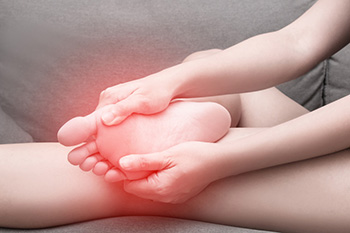
Foot issues, such as plantar fasciitis, heel spurs, and claw toes, can significantly impact daily life. Plantar fasciitis is an inflammation of the plantar fascia, the thick band of tissue connecting the heel to the toes, causing sharp heel pain, especially in the morning. Heel spurs are bony protrusions that can develop on the heel bone, often linked to plantar fasciitis, leading to persistent pain and discomfort. Claw toes occur when the toe joints bend excessively, resulting in a claw-like appearance. Symptoms include pain, redness, and difficulty wearing shoes comfortably. Experiencing persistent symptoms warrant professional evaluation. A podiatrist might recommend custom orthotics, targeted exercises, or, in some cases, surgery to address the underlying issues. If you are experiencing foot pain or discomfort, it is suggested you schedule an appointment with a podiatrist for an accurate diagnosis and effective treatment options tailored to your needs.
Foot Pain
Foot pain can be extremely painful and debilitating. If you have a foot pain, consult with one of our podiatrists from Coastal Foot & Ankle Wellness Center, LLC. Our doctors will assess your condition and provide you with quality foot and ankle treatment.
Causes
Foot pain is a very broad condition that could be caused by one or more ailments. The most common include:
- Bunions
- Hammertoes
- Plantar Fasciitis
- Bone Spurs
- Corns
- Tarsal Tunnel Syndrome
- Ingrown Toenails
- Arthritis (such as Gout, Rheumatoid, and Osteoarthritis)
- Flat Feet
- Injury (from stress fractures, broken toe, foot, ankle, Achilles tendon ruptures, and sprains)
- And more
Diagnosis
To figure out the cause of foot pain, podiatrists utilize several different methods. This can range from simple visual inspections and sensation tests to X-rays and MRI scans. Prior medical history, family medical history, and any recent physical traumatic events will all be taken into consideration for a proper diagnosis.
Treatment
Treatment depends upon the cause of the foot pain. Whether it is resting, staying off the foot, or having surgery; podiatrists have a number of treatment options available for foot pain.
If you have any questions, please feel free to contact one of our offices located in St. Augustine, and Palatka, FL . We offer the newest diagnostic and treatment technologies for all your foot care needs.
Erythromelalgia and Its Impact on the Feet
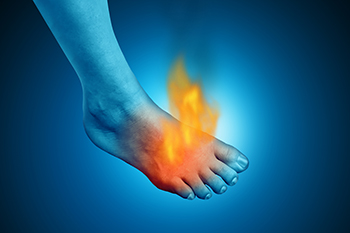
Erythromelalgia is a rare condition marked by severe burning pain, redness, and heat in the extremities, particularly affecting the feet. Individuals often experience debilitating symptoms that flare up in response to heat, exertion, or prolonged standing, leading to significant discomfort. The exact cause of erythromelalgia is not fully understood, but it is thought to involve abnormalities in blood flow and nerve function. This condition can affect people of all ages, but it is more commonly observed in adults, especially women. In the feet, erythromelalgia can hinder mobility and impact daily activities, making even simple tasks challenging. Understanding erythromelalgia is vital for those affected, as timely diagnosis and appropriate management strategies can help alleviate symptoms and improve overall quality of life. If you have any of the above symptoms, it is strongly suggested that you promptly consult a podiatrist who can help you to manage this condition.
Some foot conditions may require additional professional care. If you have any concerns, contact one of our podiatrists of Coastal Foot & Ankle Wellness Center, LLC. Our doctors can provide the care you need to keep you pain-free and on your feet.
Rare Foot Conditions
The majority of foot conditions are common and can be treated by a podiatrist. Standard diagnostic procedures are generally used to identify specific conditions and treatment can be rendered. A podiatrist also treats rare foot conditions which can be difficult to diagnose and may need extra attention and care.
There are many rare foot conditions that can affect children. Some of these can include:
- Freiberg’s disease
- Kohler’s disease
- Maffucci syndrome
Freiberg’s disease - This can be seen as a deterioration and flattening of a metatarsal bone that exists in the ball of the foot. It typically affects pre-teen and teenage girls, but can affect anyone at any age. Symptoms that can accompany this can be swelling, stiffness, and the patient may limp.
Kohler’s disease - This often targets the bone in the arch of the foot and affects younger boys. It can lead to an interruption of the blood supply which ultimately can lead to bone deterioration. The patient may limp or experience tenderness, swelling, and redness.
Maffucci syndrome - This affects the long bones in a child’s foot leading to the development of abnormal bone lesions. They are benign growths and typically develop in early childhood and the bones may be susceptible to breaking.
A podiatrist can properly diagnose and treat all types of rare foot conditions. If your child is affected by any of these symptoms or conditions, please don’t hesitate to call our office so the correct treatment method can begin.
If you have any questions please feel free to contact one of our offices located in St. Augustine, and Palatka, FL . We offer the newest diagnostic tools and technology to treat your foot and ankle needs.
How to Test for an Achilles Tendon Injury
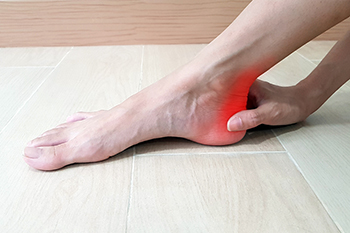
An Achilles tendon tear is a painful injury that can significantly affect mobility. Common causes include sudden increases in physical activity, sports involving jumping or sprinting, and underlying conditions like tendonitis or previous injuries. Symptoms include sudden sharp pain in the back of the heel, swelling, and difficulty walking or pushing off the foot. To diagnose an Achilles tendon tear, podiatrists may perform the Thompson's test, which calls for squeezing the calf muscle and observing foot movement. Additional assessments include plantar flexion tests, where the patient attempts to point their toes, and visual inspection for swelling or bruising. Weight-bearing tests can help determine the level of functional impairment. If you think you have sustained an Achilles tendon injury, it is suggested that you promptly schedule an appointment with a podiatrist who can provide an accurate diagnosis and treatment.
Achilles tendon injuries need immediate attention to avoid future complications. If you have any concerns, contact one of our podiatrists of Coastal Foot & Ankle Wellness Center, LLC. Our doctors can provide the care you need to keep you pain-free and on your feet.
What Is the Achilles Tendon?
The Achilles tendon is a tendon that connects the lower leg muscles and calf to the heel of the foot. It is the strongest tendon in the human body and is essential for making movement possible. Because this tendon is such an integral part of the body, any injuries to it can create immense difficulties and should immediately be presented to a doctor.
What Are the Symptoms of an Achilles Tendon Injury?
There are various types of injuries that can affect the Achilles tendon. The two most common injuries are Achilles tendinitis and ruptures of the tendon.
Achilles Tendinitis Symptoms
- Inflammation
- Dull to severe pain
- Increased blood flow to the tendon
- Thickening of the tendon
Rupture Symptoms
- Extreme pain and swelling in the foot
- Total immobility
Treatment and Prevention
Achilles tendon injuries are diagnosed by a thorough physical evaluation, which can include an MRI. Treatment involves rest, physical therapy, and in some cases, surgery. However, various preventative measures can be taken to avoid these injuries, such as:
- Thorough stretching of the tendon before and after exercise
- Strengthening exercises like calf raises, squats, leg curls, leg extensions, leg raises, lunges, and leg presses
If you have any questions please feel free to contact one of our offices located in St. Augustine, and Palatka, FL . We offer the newest diagnostic tools and technology to treat your foot and ankle needs.
When Should Babies Start Wearing Shoes?
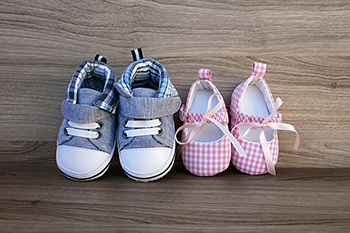
Determining when babies should start wearing shoes and choosing the right type is essential for their development. Babies typically do not need shoes until they begin walking, which is usually around nine to 12 months. Before this milestone, barefoot time is ideal as it allows for natural foot development and strengthens the muscles. Once a baby starts walking, soft, flexible shoes are recommended to protect their feet while allowing natural movement. Opt for shoes with a wide toe box, soft soles, and breathable materials to ensure comfort and proper growth. Avoid stiff or heavily cushioned shoes, as they can restrict foot development. Properly fitted shoes should support their feet without being too tight or loose, and frequent checks are necessary as their feet grow rapidly during this stage. If you have concerns about your child’s foot development and what type of shoes are best to wear, it is suggested that you consult a podiatrist who can provide you with the knowledge you are seeking.
The health of a child’s feet is vital to their overall well-being. If you have any questions regarding foot health, contact one of our podiatrists of Coastal Foot & Ankle Wellness Center, LLC. Our doctors can provide the care you need to keep you pain-free and on your feet.
Tips for Keeping Children's Feet Healthy
- Make sure their shoes fit properly
- Look for any signs of in-toeing or out-toeing
- Check to see if they have Clubfoot (condition that affects your child’s foot and ankle, twisting the heel and toes inward) which is one of the most common nonmajor birth defects.
- Lightly cover your baby’s feet (Tight covers may keep your baby from moving their feet freely, and could prevent normal development)
- Allow your toddler to go shoeless (Shoes can be restricting for a young child’s foot)
- Cut toenails straight across to avoid ingrown toenails
- Keep your child’s foot clean and dry
- Cover cuts and scrapes. Wash any scratches with soap and water and cover them with a bandage until they’ve healed.
If you have any questions, please feel free to contact one of our offices located in St. Augustine, and Palatka, FL . We offer the newest diagnostic and treatment technologies for all your foot care needs.
What Are Hallux Valgus and Hallux Rigidus?
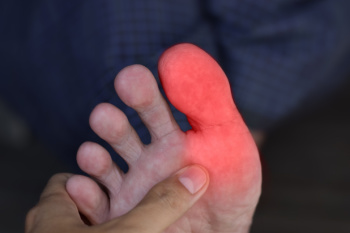
Hallux valgus and hallux rigidus are two different conditions affecting the big toe. Hallux valgus, commonly known as a bunion, is a deformity where the big toe deviates outward, causing the joint to protrude. It often results from wearing improper footwear, genetics, or arthritis, leading to pain, swelling, and difficulty wearing shoes. Hallux rigidus is a form of arthritis where the joint at the base of the big toe stiffens, limiting movement. Unlike hallux valgus, which involves deformity, hallux rigidus focuses on joint stiffness and decreased mobility. In terms of pain, both conditions can be quite painful, but hallux rigidus may be more limiting due to the loss of motion. Surgery may be required for either condition if conservative treatments do not provide relief or if the pain severely impacts daily activities. If you have pain in your big toe, it is suggested that you consult a podiatrist for a diagnosis and treatment that is deemed right for you.
Arthritis can be a difficult condition to live with. If you are seeking treatment, contact one of our podiatrists from Coastal Foot & Ankle Wellness Center, LLC. Our doctors can provide the care you need to keep you pain-free and on your feet.
Arthritic Foot Care
Arthritis is a joint disorder that involves the inflammation of different joints in your body, such as those in your feet. Arthritis is often caused by a degenerative joint disease and causes mild to severe pain in all affected areas. In addition to this, swelling and stiffness in the affected joints can also be a common symptom of arthritis.
In many cases, wearing ill-fitting shoes can worsen the effects and pain of arthritis. Wearing shoes that have a lower heel and extra room can help your feet feel more comfortable. In cases of rheumatoid arthritis, the arch in your foot may become problematic. Buying shoes with proper arch support that contour to your feet can help immensely.
Alleviating Arthritic Pain
- Exercises that stretch the foot can prevent further pain and injury and increase mobility
- Most of the pain can be alleviated with anti-inflammatory drugs, heat, and topical medications
- Massages can help temporarily alleviate pain.
It is best to see your doctor for the treatment that is right for your needs and symptoms. Conditions vary, and a podiatrist can help you determine the right method of care for your feet.
If you have any questions, please feel free to contact one of our offices located in St. Augustine, and Palatka, FL . We offer the newest diagnostic tools and technology to treat your foot and ankle needs.








